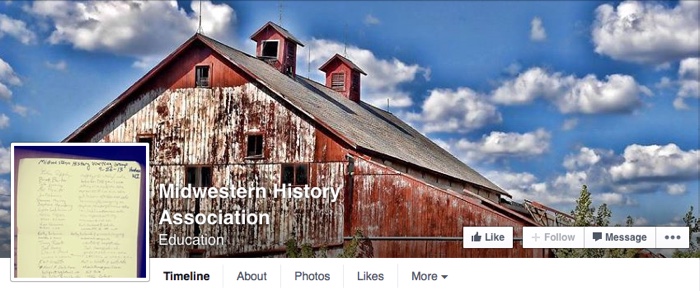Why a Midwestern History Association?
It’s now been a number of weeks since the editor of the History News Network asked me to write an op-ed piece, explaining the reasons for creating a Midwestern History Association. I have been diligently avoiding the task. And why? Because I have yet to figure out what I want to say. I’ve been worried about not being eloquent enough, not having good enough arguments – in general, not having enough. So after long and hard consideration, I decided just to tell the truth, purely from my own vantage point (meaning that these words should not be construed as those of the organization or its leadership, only my own). The best reason to have a Midwestern History Association is because there is a critical mass of scholars who are interested, and who want to be a part of the group. As of last week, more than 500 people had joined the Midwestern History Association.
There are quite a few of us studying Midwestern history. There are also quite a few of us interested in the history of the region, either because of a long-standing academic interest in the subject, or because of our locations. While some of our members have always been interested in the history of the Midwest, others have come to an interest because that’s where they ended up. Although we sometimes don’t like to admit it, location matters a great deal to a fledgling historian, or to any historian at an institution that funds humanities research in a less-than-enthusiastic fashion. Sometimes it is a matter of blooming where we are planted, and where we are planted just happens to be in Indiana, Wisconsin or Iowa.
That said, even if a historian is blooming where they are planted, they also want to be in conversation with others who appreciate and understand the work they are doing. Historians focusing on the West have long had the Western Historical Association as a place to gather with other western historians. Ditto Southern historians and the Southern Historical Association. Perhaps because these organizations have such a long history people rarely question whether or not the organization itself ought to exist – or if they do, it tends to be reflective and introspective questioning, rather than a serious challenge to the existence of the organization. Midwestern history, unfortunately, is sometimes treated in the same way as the region is in general – as “flyover history.” We seem to be off in a region of the country that no one cares about, and no one can see, in their mad rush to the perimeter. Much of the historical profession, in location as well as research focus, is still stubbornly bi-coastal. Midwestern historians, like Western and Southern historians, want to gather together with others focusing on the same region, and not have to justify their historical existence.
Now, if a historian’s primary scholarly identification is with a neglected region or group, that historian has a couple of choices. He or she can plug along in splendid isolation, hoping that his or her career won’t suffer. Alternatively, a historian can show up at someone else’s party, hoping that the other group will extend the table, maybe add a leaf or two, and make one welcome. Sometimes this works, and sometimes it doesn’t. A historian might show up, only to be told, and sometimes not very politely, that their work doesn’t really matter. That has happened to several of my graduate students when they’ve asked organizations to “extend the table” in one way or another. If you would prefer not to have that kind of experience, you can start your own table. If your group is too small, that might not work. But a group of more than 500 should have no trouble with creating its own table, and no reason not to do so.
So there you are. We are here. We care about the history of the Midwest. We write, teach and research in opposition to a bi-coastal view of the history of the nation. We look forward to the opportunity to discuss what we do without apology and without having to justify the focus of our interest. We extend to you the offer to join us at the table.
